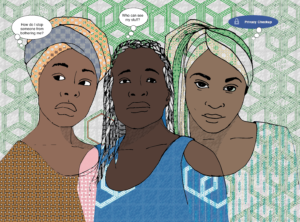Non-consensual Dissemination of Intimate Images (NCII) has become a particularly worryingly growing trend that threatens the voice and lives of many women on the continent, both on and offline. In July, African Feminism-AF published a series on online violence image-based abuse as gendered violence and its impacts on freedom of expression of women and non-binary people in Nigeria, Malawi, Uganda. The series was supported by a grant from the Africa Digital Rights Fund (ADRF), an initiative of the Collaboration on International ICT Policy for East and Southern Africa (CIPESA) to advance digital rights. On November 18, 2020, Edna Ninsiima, one of the co-editors led a conversation with authors Evelyn Lirri (Uganda), Ayodele Olofintuade (Nigeria), Sarai Chisala-Tempelhoff (Malawi) and Vivian Ouya (Kenya) on their experiences reporting on the issue and how media can best tell these stories. Here are the highlights.
What is non-consensual sharing of intimate images and why it persists?
You can’t report on what you don’t know so here are first reflections.
Ayodele Olofintuade: Non-consensual distribution of intimate images is a tool of shame. They say stuff like I’ll disgrace you, I’ll strip you naked on the streets and disgrace you. Because in Nigeria and several parts of the world, being naked on the street is like the most shameful thing that can happen to somebody. At the root of it is the shame and the manipulation. It happens a lot in the queer community, particularly in the queer community in Nigeria with the threats of being exposed, of being “outed”, and it’s just a sad, sad thing.
Vivian Ouya: When you share someone’s explicit images without their consent when you share someone’s nudes they gave you in trust and confidence, either privately or publicly that is image-based sexual violence. Our bodies are not our own under the patriarchy. We don’t have a contract; we have to negotiate for our own bodies under the patriarchy. So that is why you see our bodies being controlled by the government, you can’t even have the right to decide if we want to give birth or not. That is why you see women being stripped in Parliament, stripped in the public because our bodies are not our own. So that is why image-based sexual violence is a thing of power. It thrives under the patriarchy because men see this power over our bodies, and they say, now that we have this power, what do we do with this power? How do we maintain this power? What do we do to make sure that we assert this power on women? Once a woman’s explicit image is intentionally distributed online, you can see the shame that is attached to these images, but when a man’s image is intentionally shared online, you can see that it is almost a symbol of pride to this man, of very powerful masculinity. A woman’s body under the patriarchy belongs to a man, to the society, to the state, belongs to everybody else except that woman. But then for the man, it’s a symbol of power because their bodies are not attacked and overly sexualised, their bodies belong to them so they can do whatever they want with them.
Sarai Chisala-Tempelhoff: It is like we embody that shame in our nudity just by the very essence of being seen. As if the entire moral issue lies upon a woman to cover up her body and to be in charge of covering up and saving her nudity. This idea that our bodies are not our own, our nudity is not our own at the same time, whilst it’s being consumed very widely and that consumption then, in turn, relates to the whore complex. You are now a whore because people are seeing your naked body. You lose your job, you face violence, because there’s a sense of entitlement that comes out in men when they have seen your naked body. We have already seen you; therefore, we own you; therefore, we can do whatever we want with you.
Ayodele Olofintuade: There’s the intersection between homophobia and femmephobia It is not about that person’s body; it’s your power to consume that person’s body. And it shocks me how violently homophobic even in feminist communities can be. And if you have that kind of body, whether you’re naked or you’re not naked, that is not the problem. The problem is you are automatically the possession of every male presenting person around you. They believe they have the right to your space, to your time, to your body. You do not have a right to your body. You do not have autonomy. So everybody has a right to your body.
Language is essential in framing violence
Vivian Ouya: Revenge porn is not the ideal term because first of all, it is not revenge. And second of all, it is not pornography. So if we say revenge, we are focusing on the intent, you know, the intent of the perpetrator. We are saying that this man something must have happened to him to make sure that he releases this victim’s images. So if we say revenge, we are literally saying what matters most is that the victim did something but not that the victim didn’t consent to this. And then it is not pornography largely because the term pornography is tied to consumption. When we say porn, people think of consuming porn, watching porn and doing whatever they want to do to that pornography. So it perpetuates the idea that once you release such images, or once you release such videos, then it is for consumption so that you can be shared around.
Victims more likely to be women
Sarai Chisala-Tempelhoff: The person whose image is being shared and devoured by wider society is consistently and continuously the one blamed for the creation of that image, regardless of the context within which it was created, and for the sharing and the continuous consumption of that image. So it’s a paradox where you have victims who are never almost never recognized as victims. It’s that much more painful because I think the real victimization happens in the fact that nobody recognizes the pain and the struggle that you’re going through. The fact that your reputation, as it were, is affected, you know these countries of ours reputation is almost everything. You’re not going to get a job at the bank, that training position that you wanted, you’re not going to be considered to continue your teaching position. I know women who have immediately been demoted because they’re experiencing it.
Evelyn Lirri: One of the challenges that they (victims) have to live with is the fact that once these images are out in public on the internet, they’re there forever. There have been so many efforts for victims to try and get the images off the internet, and that has been problematic. Over time, they’re trying to cope and, trying to move on with their life but then, the constant reminder that there’s this image of yours online. When you have something good going on for yourself but people keep bringing these old images back into your face. All the efforts they’ve taken to try and get these images off the internet have failed. The laws in the country do not favour the people whose images have been put out there, whose images have been shared out in public. Many of the cases, at least in Uganda, the victims tend to be the women. Even from the law enforcement aspect itself, the focus is ‘we are going to arrest this person because their images are out there’ not in one case has there been law enforcement officials saying we are going to look for the person who has actually shared the images or who were circulating these images.

Justice system fails to counter new forms of violence
Sarai Chisala-Tempelhoff:
What I have noted from Malawi, from Uganda, and so from some of the other legal systems have new laws purportedly to deal with this new form of violence, but they’re just pretty reenactment for old views of women’s bodies when you read these provisions carefully. What they do is place all of the burden of showing that someone’s experience was a violent and an illegal one upon the victim. So cyber harassment, for example, requires the victim to show that her attacker made a request or a suggestion or proposal and that that suggestion was obscene or lewd. So again, obscene on whose terms, why do we have terms that are so laden in Victorian ideas of morality still appearing in new legal documents? Offensive communication, the victim must show that her harasser willfully and repeatedly used electronic communications to disturb her peace or quietness. Cyberstalking, the victim has to show that her harasser willfully, maliciously and repeatedly uses electronic communication to abuse her. You’re asking somebody who has just experienced some of the worst days of their lives when their intimate images were broadcast.
Why should it be upon a victim to show that something is abusive when everybody has already seen this video, so the abuse itself is evidence just from the very fact that everyone has seen these images? The reality is we create these beautiful new pieces of legislation and plunk them upon a system that’s already broken or was built that way, it was never meant to work for us, and we suddenly expected to turn around and ensure that victims of this kind of violent Victorian framed morality based abuse should be assisted by systems that were never ever created for that kind of assistance. I don’t know; there are no gaps; there are just gaping holes.
Ayodele Olofintuade: We need to build coalitions so that when your image is shared on WhatsApp or Facebook, we will take it down. We go and sue those companies too. Once those companies start getting sued, we as Africans and feminists take on these big companies and regularly hound them because they profit from it, let’s follow the money.
Evelyn Lirri: If we can do stories around this really differently, bring experts in. If we change the law but also then change the perception of people by writing stories that do not victimize people, then we are able to change the whole narrative around non-consensual sharing private images and the shaming that comes with it. So it all starts with us as journalists by learning what we can. Journalists or the media, in general, have a huge role to play in this. If they helped shape how the conversation goes then the rest of the people, hopefully, will be able to get it and then we do better.
Find the webinar video here
Ayodele Olofintuade is an author, researcher and journalist. She is the managing editor of 9jafeminista, a feminist ezine.
Evelyn Lirri is a Ugandan freelance journalist She is also the current editor of Stories4Humanrights. Follow her on Twitter at @Elirri
Sarai Chisala-Tempelhoff is a human rights lawyer and legal researcher. She’s the Founder of a women’s legal empowerment initiative: The Gender and Justice Unit. Twitter: @saraichisala
Vivian Ouya is a Lawyer and Co-Founder Feminists in Kenya. Find her on Twitter @OuyaVivianne

